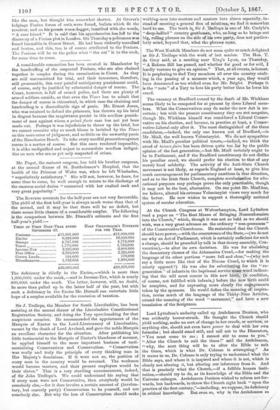At the Church Congress at Wolverhampton, Lord Lyttelton read a
paper on "The Best Means of Bringing Nonconformists into the Church," which, though it was not so bold as we should wish, was a very great advance on the ordinary " non-possumus " of the Conservative Churchman. He maintained that the Church should have power,—with the concurrence of the State,—(we do not see why an Act of Parliament, which is certainly sufficient for such a change, should be preceded by talk in that dreary assembly, Con- vocation),—to alter its own doctrines. He was for abolishing the damnatory clauses of the Athanasian Creed,—for making the language of its other portions "more full and clear,"—(why not say a little more like that of the Nicene Creed, to which it is utterly opposed ?) He was also for substituting for the " re- generation " of infants in the baptismal service some word indicat- ing that the will must concur in this new birth, (a condition, of course, not fulfilled with infants,) before the new birth could be complete, and for expressing more clearly the engagements taken by the sponsors. He would define the meaning of inspira- tion, revise much of the language of the Thirty-Nine Articles, extend the meaning of the word "sacrament," and have a new translation of the Scriptures.






























 Previous page
Previous page